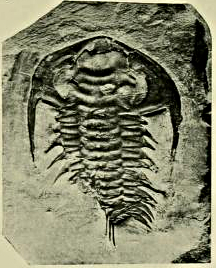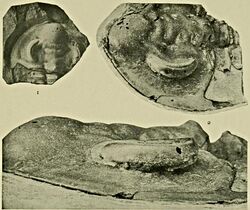Holmia (genus)
Topic: Biology
 From HandWiki - Reading time: 3 min
From HandWiki - Reading time: 3 min
| Holmia | |
|---|---|

| |
| Holmia kjerulfi, as depicted by Kiaer, 1916 | |
| Scientific classification | |
| Kingdom: | |
| Phylum: | |
| Class: | |
| Order: | |
| Suborder: | |
| Superfamily: | |
| Family: | |
| Genus: | Holmia Matthew, 1890[1]
|
| Species | |
| |
Holmia is a genus of a well known group of extinct arthropods, the trilobites, that lived during the Lower Cambrian (Atdabanian) in what are now Scandinavia, Poland and Morocco.
Etymology
Holmia is the Latin name for Stockholm, in the neighborhood of which early finds of this trilobite were collected. H. kjerulfi was named in honor of the Norwegian geologist and paleontologist Theodor Kjerulf.
Taxonomy
Species previously assigned to Holmia
- H. hyperborea = Mesolenellus hyperborea
- H. ljungneri = Fallotaspis ljungneri
- H. lundgreni = Elliptocephala lundgreni
- H. macer = Mummaspis macer
- H. mickwitzi = Schmidtiellus mickwitzi
- H. mirabilis = Elliptocephala mirabilis
- H. rowei = Esmeraldina rowei
Distribution
- H. kjerulfi occurs in the Lower Cambrian of Norway (near Tomten, Sparagmite Formation, Mjosen, Atdabanian, 60.9° N, 10.7° E),[1] and Poland (Ocieseki Sandstone Formation, Holy Cross Mountains, Atdabanian, 51.0° N, 20.0° E).[3]
- H. grandis occurs in the Lower Cambrian of Norway (near Tomten, Sparagmite Formation, Mjosen, Atdabanian, 60.9° N, 10.7° E).[1]
- H. glabra and H. orienta are found in the Lower Cambrian of Poland (Ocieseki Sandstone Formation, Holy Cross Mountains, Atdabanian).[3]
- H. lapponica was found in the Lower Cambrian of Sweden (Grammajukku Formation, Holmia kjerulfi-zone, on the NE shore of Lake Langvattnet near Langsjoby, 10 km W of the village of Storuman, county of Vasterbotten, southern Swedish Lapland).[2]
- H. palpebra was collected from the Lower Cambrian of Sweden (Upper part of the Grammajukku Formation, in the Holmia kjerulfi-zone, E bank of the Torbacken rivulet, about 600 m South-Southwest of Delliknas, the Laisvall area, central Swedish Lapland).[2]
- Unidentified specimen probably belonging to Holmia are also known from the Lower Cambrian of Morocco (Issafen Formation, Antatlasia gutta-pluviae/Sectigena-zone, Atdabanian),[4] and Sweden (shore 600 m North of Gislövhammar, Gislöv Formation, Atdabanian (55.5° N, 14.3° E).[5]
References
- ↑ 1.0 1.1 1.2 1.3 Kiaer, J. (1916). "The Lower Cambrian Holmia fauna at Tomten in Norway". Videnskapsselskapets Skrifter. I. Matematisk - Naturvitenskapelig Klasse (10): 140. https://archive.org/details/cbarchive_40610_thelowercambrianholmiafaunaatt9999.
- ↑ 2.0 2.1 2.2 Lieberman, B.S. (1999). "Systematic Revision of the Olenelloidea (Trilobita, Cambrian)". Bulletin of the Peabody Museum of Natural History 45. http://peabody.yale.edu/sites/default/files/documents/scientific-publications/ypmB45_1999.pdf.
- ↑ 3.0 3.1 Orlowski, S (1975). "Jednostki litostratygraficzne kambru i gornego prekambru Gor Swietokrzyskich [Cambrian and Upper Precambrian lithostratigraphic units in the Holy Cross Mountains"]. Acta Geologica Polonica 25 (3): 431–448. http://www.pbdb.org/cgi-bin/bridge.pl?action=basicCollectionSearch&collection_no=72261.
- ↑ Geyer, G; Palmer, A. R. (1995). "Neltneriidae and Holmiidae (Trilobita) from Morocco and the problem of Early Cambrian intercontinental correlation". Journal of Paleontology 69 (3): 459–474. doi:10.1017/S0022336000034867. http://www.pbdb.org/cgi-bin/bridge.pl?a=displayCollResults&taxon_no=19133&max_interval=Cambrian&country=Morocco&is_real_user=1&basic=yes&type=view&match_subgenera=1.
- ↑ Bergström, J.; Ahlberg, P. (1984). "Uppermost lower Cambrian biostratigraphy in Scania, Sweden". Geologiska Föreningen i Stockholm Förhandlingar 103 (2): 193–214. doi:10.1080/11035898109454518. http://www.pbdb.org/cgi-bin/bridge.pl?a=displayCollResults&taxon_no=19133&max_interval=Cambrian&country=Sweden&is_real_user=1&basic=yes&type=view&match_subgenera=1.
Wikidata ☰ Q5883757 entry
Licensed under CC BY-SA 3.0 | Source: https://handwiki.org/wiki/Biology:Holmia_(genus)3 views | Status: cached on September 16 2024 04:22:29↧ Download this article as ZWI file
 KSF
KSF
